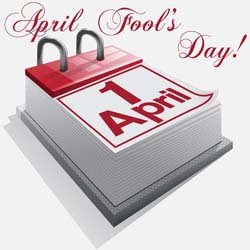Spoiler alert: This is not an April Fools’ Day story; this is a story about April Fool’s Day. Really.

We wondered how the custom of pulling pranks and telling tall tales on April 1 got started in this country and consulted the very short list of Rutgers scholars who might know. None did, but Angus Kress Gillespie, professor of American studies in the School of Arts and but Sciences, was kind enough to give the day some historical perspective. Gillespie is the author, most recently, of Crossing Under the Hudson: The Story of the Holland and Lincoln Tunnels (Rutgers University Press, 2011).
Rutgers Today: How long has April 1 been a day of pranks and nonsense in the United States?
Angus Kress Gillespie: It's hard to pinpoint the origins of April 1st in the United States. Explanations are many, and often as foolish as the day itself. A poem in "Poor Robin's Almanac" of 1790, a British satirical publication, alludes to the fact that the exact origin of the day is lost to history:
The first day of April, some do say,
is set apart for All Fool's Day.
But why the people call it so
Nor I, nor they themselves do know
But on this day are people sent,
on purposes of pure merriment.
Rutgers Today: Has the character of the day changed over time?
Gillespie: Generally, April Fools' Day is a day when we can lie to our friends and cause them great anxiety as long as we justify our actions by exclaiming "April Fool!" We can, and in fact, are supposed to, dream up elaborate practical jokes to snare the unsuspecting. But April Fools' Day revolves around only this single custom of practical joking, and is no longer a fully realized celebration with music, dance, costumes, masks or food and drink.
Rutgers Today: Have you ever been the perpetrator of, or victim of, an April Fools' Day prank? Did it make you laugh, or make you angry?
Gillespie: It's rather difficult to succeed in fooling one's friends because they usually are aware of the day, unless you catch them very early. I remember only once in really succeeding with a prank. I was teaching at a school in Philadelphia and I filled out one of those "While You Were Out" telephone messages on official pink paper and left it in the mailbox of a good friend and fellow teacher. The message instructed him to return a call from Mr. Lyon with a phone number. The catch was that the phone number was that of the Philadelphia Zoo.
Media Contact: Ken Branson
732-932-7084, ext. 633
E-mail: kbranson@ur.rutgers.edu